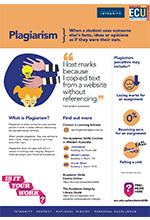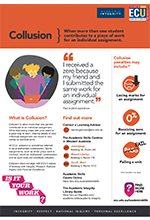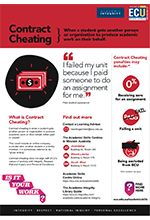What is Plagiarism?
Plagiarism is defined as presenting, “intentionally or unintentionally, the ideas or work of another person as one’s own ideas, or work without appropriate referencing or acknowledgement” (Edith Cowan University, 2019b, p.4). Plagiarism is the most common and well-known form of academic misconduct. It also includes unacknowledged use of a generative artificial intelligence tool such as ChatGPT
It also includes self-plagiarism which is using your own work and not appropriately referencing or acknowledging it as work you have previously had marked or published. However self-plagiarism IS NOT considered to be academic misconduct at ECU.
Cultural Differences
The concept of plagiarism is sometimes difficult to understand, particularly if you are new to study in Australia. Different countries have differing acceptable practices when it comes to using the work of others.
For example, in some countries it is acceptable to use the ideas, thoughts and views of others without acknowledgement. In Australia, as in many other countries, this is seen as stealing. In other countries you must use the authors’ exact words, which is termed a direct quote.
In Australia, you must include a citation, also known as a reference, whenever you use ideas, viewpoints or findings that originated from another author to support your argument or discussion. You are encouraged to paraphrase these ideas, viewpoints or findings into your own words, which is called your academic voice, but some disciplines allow you to also include direct quotes.
If you are unsure how to paraphrase or reference then seek help early on in the semester. Links to access this help are listed on the right-hand-side.
Outcome(s) if you plagiarise

Download the Plagiarism flyer.
Download the Paraphrasing flyer
Five Strategies to avoid Plagiarism
- Learn how to in-text and end-text reference:
- View the Quick Guide to APA 7th Referencing Guide
- Attend a Referencing Workshop.
- Be AWARE of the referencing style required of the assessment task.
- Keep track of your research which includes good note-making.
- Develop your paraphrasing and academic writing skills.
- Complete a Skills Audit to identify the skills you are less confident in.
- Attend Academic Writing Skills Workshops.
- Seek out ongoing support
- In the Library (Referencing):
- Visit the Referencing Library Guide.
- Know who your School Librarian is.
- Academic Skills Centre (Paraphrasing & Academic Writing):
- Know who your Senior Learning Adviser is.
- Attend School specific workshops.
- Seek feedback from a Learning Adviser on your draft assessment task.
- Learn how to read and interpret a Turnitin Report: Watch Reading and Interpreting a Turnitin Report video presentation and the Interpreting Similarity Reports in Turnitin video.
- In the Library (Referencing):
Download the Avoiding plagiarism checklist.
Be Proactive! Engage in your learning so that you can gain knowledge and learn the academic writing skills such as paraphrasing and referencing and to avoid plagiarism.
Turnitin:
Watch the Reading and Interpreting a Turnitin Report video presentation.
If your Unit Coordinator allows, submit your draft assessment task through Turnitin a few days before the due date. This will highlight any issues via the similarity report that is produced. You can then review your work and make any changes. Do this at least 24 hours before the submission date.
NOTE! A similarity Report is not a plagiarism report. If you need help to interpret your similarity report ask your tutor or speak to a learning adviser in the Academic Skills Centre.
More detailed information can also be found in the Submitting Assessments page within the Library Essentials program.
Endnote:
Endnote is a software referencing tool such which is free for all ECU students and a great tool for tracking research and automating in-text and end-text referencing.
BUT YOU MUST know how to reference before you start using it! It is not a quick fix and can cause much stress and anxiety if you do not set it up correctly. Always go to an Endnote Library training session before you start using Endnote.
Endnote Training sessions are delivered by the Librarians throughout the semesters.



